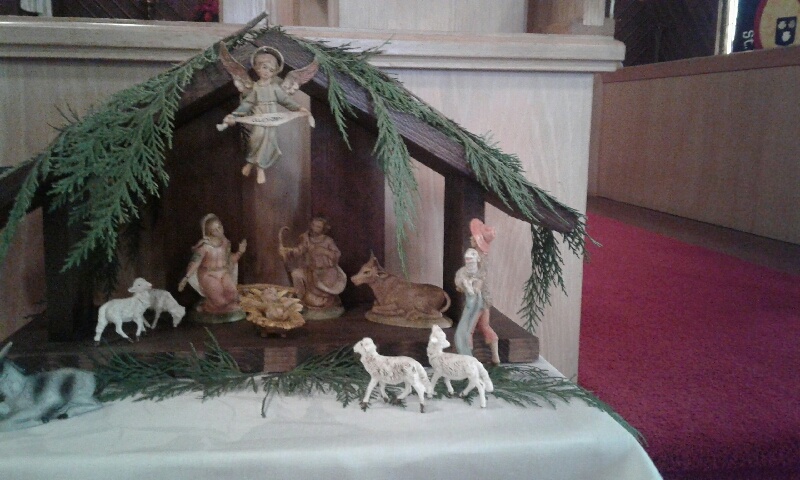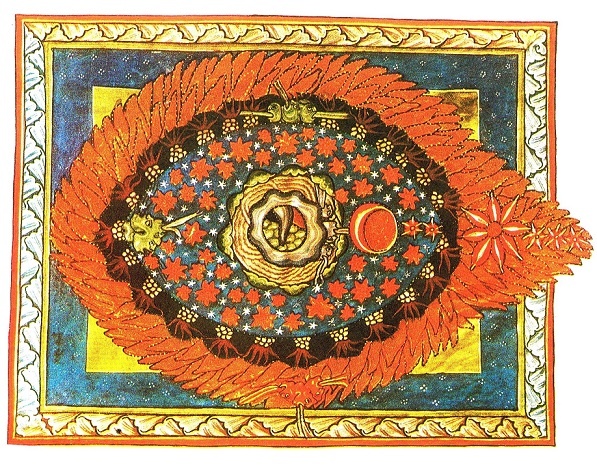
Christmas Eve, 8:00
24 December 2019
This evening’s readings are:
Isaiah 9:2-7
Psalm 96
Titus 2:11-14
Luke 2:1-20
Click here to access these readings.
There is a book at our house that is read each and every day. We think about it in the wee hours of the morning and, often, its words are our last as we lay our head to sleep. No, it is not the Bible; it is not the Book of Common Prayers or our hymnal. It’s this: What’s that sound, baby Daisy?
Now, if you have children, or you had children, or you spent even a tiny little bit of time around children, you’ll know that they love doing things (and especially reading certain books) again and again and again. And I’m like, great, awesome, let’s read these great children’s books that have really beautiful pictures and deeply engrossing stories – but no, we read What’s that sound, baby Daisy again and again and again. And I’m like, really? This again? My kids love this book so much that once Fiona couldn’t even wait until she reached me on the chair but had to throw it across the room at me. And it might not look like it, but this book hurts!
But that’s kids, right? Kids like doing things over and over again. I’ve heard people say it’s because they love routine and things that are set; the world is so confusing for them; they go to sleep here in their car seat and when they wake up, they’re somewhere else! I’ve heard it’s soothing for them to do things each day the same way.
And I think that’s probably true, but I think it’s also something else, and that’s that kids kinda love differently than we adults do. We’ve all got things we’ve learned to like and to not like. For instance, I deeply dislike pickles, and if you ever want to hear the Great Saga of Pickle Day, let me know, but make sure Helene’s not in the room, because I think she’s done hearing about it (seriously, it’s a real thing). And kids have things they don’t like, too, but for them, their hearts are open in wonder, because everything is new for them. The other day, I was telling Gwendolyn what a “one horse open sleigh” was and she was mystified that there was a time where we didn’t have cars. We’re amazed when a new Star Wars movie comes out, or when we find a new planet out in the galaxy that might have life on it, or that it’s finally time for the stores to carry egg nog again. But kids are amazed and filled with the deepest of wonder when you turn down a different street on the way to town (“wow, I’ve never been here before!”) or you open up a rarely-used cupboard, even if it’s empty, and they’re all like, “Wow, the wall opens!” For kids, everything is new, and so much of it is wonderful and magical and unreal. And that’s because they’re new, and their love is open and free.
And I say all this not to just say something nice about kids but also to say something very important about God. This evening, Christmas Eve, the good old night before Christmas, we gather together to celebrate the Incarnation, that time when God came to us as a human, as Jesus Christ, God in the flesh. And when we think about Jesus, and Jesus’ presence in the world, often we think of him as an adult; you know, with that nice beard, the robes, standing with people around him teaching or healing or giving hope where even the word itself was forgotten. Or else we think of him with the Cross, either carrying it step by brutal step, or hanging on it, breathing his last. These images of Jesus, they touch us, they touch us deep in the heart, or in the mind, or in the gut. We carry these images with us as we live the Christian life, for they call us to live as Christ lived, as God lived, and that is to heal those who are sick, to give comfort to the lonely and the sorrowful, to feed the hungry, whether their hunger is of the stomach or of the mind or of the heart, and to place our hope not in earthly things but in heavenly things. Jesus, as an adult, taught us how to live.
But Jesus was not just an adult; Jesus was also a baby. Jesus didn’t beam down from heaven as a fully formed individual. Jesus wasn’t carved out of stone, like Michelangelo carved his statue of David, perfect in every proportion down to the tiny little pinky finger. Jesus was born. Jesus was an infant and a toddler, he was a little kid and a teenager and a young man. Jesus, who we believe was fully God, also was fully human, and day by day grew up, just like we have.
And as a child, Jesus must have had that same wonder at the world as I just described. Or, to put it better, we have that wonder because God’s love of the world is child-like. Not ‘childish’, mind you, but ‘child-like.’ The difference is important. We all know the childishness of kids, and all of us, I’m sure, still have a few bits of childishness in us as adults, too. Childishness is taking things for granted. It’s living as if everyone’s job is to comfort and care for us. We act this way as children because we do need all that care and attention, and we haven’t lived long enough to gain a healthy respect for the world around us and not take things for granted. But as adults, this childishness makes us proud, or haughty, or careless. In such childness we forget about others around us, and we put ourselves on a pedestal as an idol. And much of the work of the Holy Spirit, it seems, is knocking that idol over and turning our eyes, again and again, to the loving light of God. Childishness is pretty dangerous.
Being child-like, however, that’s different. I think our presiding bishop Michael Curry. If you’ve ever seen him preach, he’s always jumping around and waving his arms, and I wonder that he hasn’t knocked candles over and set fire to his alb yet. And his face: you can see the love of God written all over his face, as if his heart was a beacon, drawing everyone around him to the presence of God. But I’ve also seen that child-like-ness here at St. James, in the love of this church and all it has meant to you, even if you don’t know how to put it into words; I see it in your love of a hymn, in your readiness, seemingly without a thought, to welcome people in off the streets no matter how tired or wet or smelly or confused they are, and to work tirelessly to help them. And I’ve had the distinct joy to be with you at the altar as you meet Jesus Christ in the holy sacrament, and I’ve knelt with you as we’ve all confessed our sins with a ready heart. This openness to God, this openness to the hurt and the hope of the people around you, and this love of the beauty of the natural world, the liturgy, and the life of one another, this is a child-like openness. And we adults, who so often forget in our own times of grief and resentment, need to be reminded often, but especially on Christmas, that God was child-like as a baby in the manger and, so too, is God child-like in heaven, in his earnest and eternal love for us.
And that is the Gospel. That’s that “good news”, which is really what the word “Gospel” means: that the foundation of the world, that the one who created everything that is in this world, from the tiniest little single-celled organism up to the planets, stars, and galaxies, all that is founded firmly on one thing: Love. And I don’t mean the love that we celebrate on Valentine’s Day, though that love is (or should be!) founded on that love. I mean this: those moments in your life, and hopefully there are many, those moments when we see that what really matters isn’t the darkness that is all around us, the hatred that people sling at one another like it’s their job, the anxiety and the sorrow, when we see that it’s not those things that are most important, but when we see, even just for a single moment, maybe just in the fleeting glance of a single person, that there is life in the world, and that that Life won’t let us fade away without a fight, that Life itself is not just a vague energy but a Person, and that that Person wants, more than anything in the world, for you and all of us and all this Creation to be whole and healthy and joyful and that, one day, we will be! That’s the love I mean.
Tomorrow is Christmas Day. We all have different ways of celebrating. Mine involves egg nog, bacon, and my family. Yours might look different. The day after that is the 26th of December. The one after that is the 27th, then on into the new year. And I want to ask you this: we Christians believe that God loved us so deeply that he became a child and lived a human life, even to being nailed up on a cross and killed. Our God did that for us so that he could open up the real meaning of Love and Life to us wayward people. How will you live differently? For we have been given a light, a great torch to bear into the darkness of this world. How will you bear that light to those who do not know hope? How will you bring that light to those locked in the shackles of grief, of hatred, of despair? For on this night, and on each and every day, in each and every moment hereafter, the Christ child may be born inside your heart, so that you too may be a flame to dispel any darkness.




